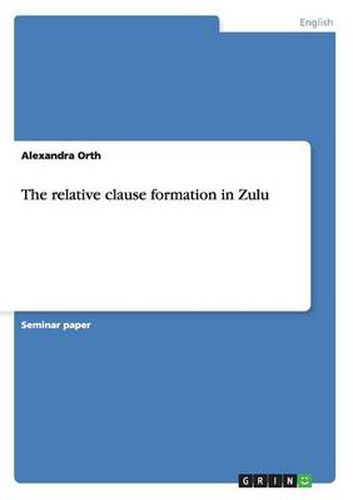Readings Newsletter
Become a Readings Member to make your shopping experience even easier.
Sign in or sign up for free!
You’re not far away from qualifying for FREE standard shipping within Australia
You’ve qualified for FREE standard shipping within Australia
The cart is loading…






Seminar paper from the year 2009 in the subject English Language and Literature Studies - Linguistics, grade: 2,0, University of Freiburg (English Seminar), course: HS: Grammaticalization, language: English, abstract: My term paper deals with one of the South African languages, the Zulu language. In my grammar report, accompanying the seminar, I already dealt with the Zulu language more precisely I tried to explain the phenomenon of the Zulu noun. Besides our seminar, the motivation and idea to deal with this topic has arisen from my personal experiences. Since I lived and worked approximately five months in South Africa last year. The Zulu language aroused my interest because it differs from all languages I know, but nevertheless it includes English words or word parts. This time, in my term paper, I will try to discuss the way of forming a relative clause in Zulu. This formation usually involves a prefix, also called relative concord, which is attached to the predicate of a relative clause. A relative clause is a subordinate clause that modifies a noun. Generally in most European languages, a relative clause is introduced by a relative pronoun, which belongs to a special class of pronouns. In other languages, relative clauses may be marked in different ways: they may be introduced by a special class of conjunctions called relativizers; the main verb of the relative clause may appear in a special morphological variant; or a relative clause may be indicated by word order alone. In some languages, more than one of these mechanisms may be possible. Since relative clauses in Zulu were formed in a different way than in most European languages I would like to examine this problem in more detail.
$9.00 standard shipping within Australia
FREE standard shipping within Australia for orders over $100.00
Express & International shipping calculated at checkout
Seminar paper from the year 2009 in the subject English Language and Literature Studies - Linguistics, grade: 2,0, University of Freiburg (English Seminar), course: HS: Grammaticalization, language: English, abstract: My term paper deals with one of the South African languages, the Zulu language. In my grammar report, accompanying the seminar, I already dealt with the Zulu language more precisely I tried to explain the phenomenon of the Zulu noun. Besides our seminar, the motivation and idea to deal with this topic has arisen from my personal experiences. Since I lived and worked approximately five months in South Africa last year. The Zulu language aroused my interest because it differs from all languages I know, but nevertheless it includes English words or word parts. This time, in my term paper, I will try to discuss the way of forming a relative clause in Zulu. This formation usually involves a prefix, also called relative concord, which is attached to the predicate of a relative clause. A relative clause is a subordinate clause that modifies a noun. Generally in most European languages, a relative clause is introduced by a relative pronoun, which belongs to a special class of pronouns. In other languages, relative clauses may be marked in different ways: they may be introduced by a special class of conjunctions called relativizers; the main verb of the relative clause may appear in a special morphological variant; or a relative clause may be indicated by word order alone. In some languages, more than one of these mechanisms may be possible. Since relative clauses in Zulu were formed in a different way than in most European languages I would like to examine this problem in more detail.